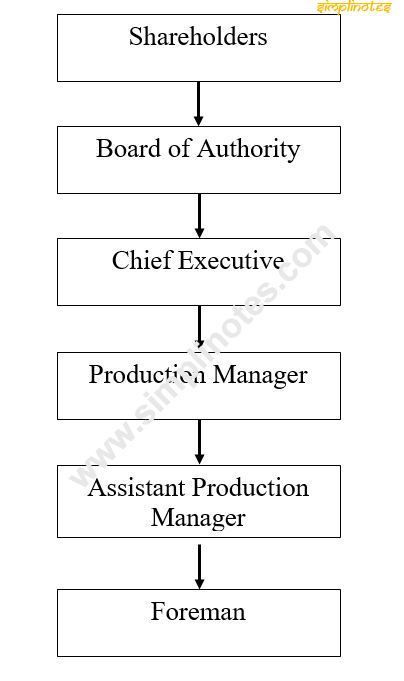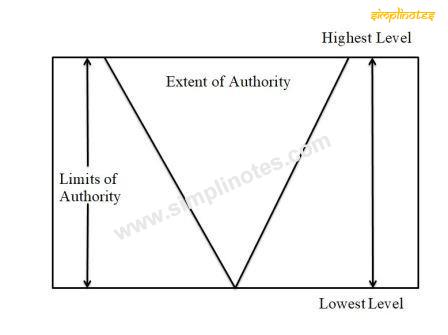Sources of Authority
There are broadly three theories regarding source from which authority originates. They are:
1. The Formal Authority Theory
2. The Acceptance Theory
3. The Competence Theory
1. The Formal Authority Theory
According to this theory, all authority originates in the formal structure of an organization. The source of authority is traced upward from any managerial position. Flow of this authority is known as top-down authority. Thus the foreman in an organization may derive his authority from the Assistant Production Manager. In its turn, the Assistant Production Manager derives his authority from the Production Manager; Production Manager from the Chief Executive; Chief Executive from the Board of Directors; and Board gets its authority from the shareholders. In fact, managers at each level of the organization derive their authority from the managers at the higher levels.
2. The Acceptance Theory
It is contended by Bernard, Simon and Tannenbaum that formal authority is, in effect, nominal authority and it becomes real only when it is accepted. Thus the authority of a manager is determined by the acceptance of it by the subordinates. Acceptance theory views authority as being present when a directive is legitimized by virtue of its acceptance form below. Authority exists when subordinates are willing to be directed. For the first time, Barnard challenged the traditional concept of flow of authority from top to bottom. According to him:
“Authority is the character of a communication (order) in a formal organization by virtue of which it is accepted by a contributor to or a member of the organization as governing or determining what he does or is not to do so far as the organization is concerned. “
A particular manager may possess formal authority but such possession is meaningless unless authority can be effectively exercised. The subordinates will accept or reject formal authority only after a careful analysis and evaluation of the advantages of accepting and the disadvantages of not accepting it. The subordinate will obey his superior and accept his authority only when he finds that advantage assuring to him from such obedience exceeds the disadvantages that he will have to suffer in the events of non-obedience. Thus, a subordinate may accept the authority of a manager because:
i. He may consider it is a contribution to the realization of organizational objectives.
ii. He may get rewards from his superiors in the form of more pay, promotion, prestige, status, etc.
iii. He may have due regard for old age, experience, character, competence, etc., of his superiors.
iv. He may be able to avoid the necessity of accepting responsibility.
v. He may be dictated by his moral standards of conscience.
vi. He may be able to earn the approval or appreciation of his fellow workers.
vii. He may be afraid of losing financial and non-financial rewards.
viii. He may have learnt acceptance of authority from childhood and thus, it may have become a part of his life.
ix. He may believe that certain commands are legitimate and should be followed.
The Acceptance Theory has not found favour with management experts, like Theo Haimann, Koontz and O’Donnell and Mandeville. According to them, it is unrealistic to subscribe to acceptance theory of authority. Some of the views expressed by the exponents of this theory are valid in the discussion of concept of leadership but. in the concept of authority, it is difficult to assume that a subordinate has the choice of accepting authority.
3. Competence Theory
In addition to formal and acceptance theories of the sources of authority, there is a feeling that authority is generated by personal competence. Urwick identifies formal authority as being conferred by organization, technical authority as being implicit in special knowledge or skill, and personal authority as being conferred by seniority or popularity. A person may get his order or advice accepted by others mot because he is having any formal authority, but because of his personal qualities. These qualities may be technical competence and social prestige such as competent engineers, economists, etc. in the organization whose advice may be sought and followed unerringly as if this is an order. Similarly, in other social groups, people with charisma have the same effect.
Limits of Authority
In an organization, the quantum of authority decreases at successively lower levels; it is maximum at the highest level and minimum at the lowest level as shown in figure:
The authority is not absolute. The authority enjoyed by an organisation is exercised subject lo various social, legal, political, and economic factors. Similarly, the use of authority by a superior over his subordinates is restricted by various factors. These factors are as follows:
i. The authority is exercised with regard to mores and folk ways of the group concerned. The use of authority generates different reactions from various groups. The authority must be exercised keeping in view the group’s fundamental social beliefs, codes, creeds and habits, otherwise the effective exercise of authority is limited.
ii. There are biological limits on the authority. Human beings do not have the capacity to do certain things. An individual cannot be asked to walk up the side of a building. Similarly, there are physical—climate, geography, physical laws and others, economic competition, market factors, etc., and technical limitation on the use of authority. These all suggest that an individual cannot be ordered to do a thing which is not possible because of these limitations.
iii. There are certain limitations which restrict managerial authority. Such factors as partnership agreements, memorandum of association, articles of association, business laws, and company laws put limitations on authority. A manager has to exercise authority in these contexts. Changes in these can be made, but these can be done through a definite procedure and not at the whim of a manager.
iv. A manager’s authority is limited because of the fact that his span of management is limited. The exercise of authority requires to take decisions and a manager cannot take such decisions about unlimited number of persons. Thus, his authority is limited to the subordinates who are managed by him.
v. A manager can use the authority which is specifically delegated to him. Delegation of authority is required because of the assignment of duties and responsibilities.


